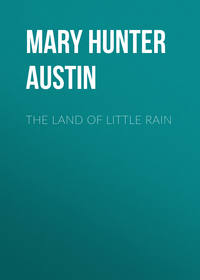
California
Whether the ghosts of the departed peoples ever revisit the ancient beaches, the ghosts of waters haunt there daily. Morning and mid-afternoon the rivers of mirage arise; they well out of the past and are poured trembling on the plain; phantom fogs blow across them, wraiths of trees grow up and are reflected in false streams. Often in very early light there are strange suggestions of – dunes and boulders perhaps? Only no boulders in that country are flat-topped like the houses built in lands of the sun, and no dunes are wall-sided. Mirage, we are told, is but a picture of distant things, mirrored on atmospheric planes, but then maybe a ghost is only a mirage deflected on our atmosphere from worlds outside our ken, and it is always easy in the desert to see things that you cannot possibly believe. Whatever they are, mirages are real to the eye. I mean that they are not to be winked away nor dissipated by contact. I have watched a vaquero ride into one of them and drown to all appearances, or seem to be swimming his horse across its billows, all of him below its surface as completely hidden as by rivers of water. Moreover, mirages tend always to occur under given conditions and in the same places. I recall one of the stations on the old Mojave stage road, which, approached from the north about an hour after sunrise, would instantly duplicate: two houses, two lines of poplars, two high corrals.
Occasionally along the edge of the sage-brush country one may see that surpassing wonder, the moon mirage, poured like quicksilver along the narrow valleys, as if the thirsty land had dreamed of water.
It is odd how this suggestion of sea and river clings to a country where there is nothing harder to come by than good water to drink. For any other purpose it is not to be thought of. After one of those terrible wind storms, the only really incommoding desert weather, it is possible to find great spaces all rippled and lined in water-markings like a sea that has suddenly undergone a magic transformation into sand. The contours of the desert ranges are billowy; they rise out of the plain like the grey-backed breakers of open sea. The valleys between are narrow and trough-like; the shores of them are lined with crawling dunes that, under the steady pressure of wind currents, are for ever sliding up their own peaks and down the other side, changing place without ever once losing the long slope to windward and the abrupt landward fall of waves.
Another item which adds to the suggestion of the illimitable spread of sage-brush country, like the sea, is the way the sparse forests of the mountain-tops appear to be islanded by it. For the sage-brush extends on across the Great Basin, it stretches into Montana and south to Arizona and New Mexico, it works about the lower end of the Rocky Mountains and well into the great central plain. The ranges lie thick in it as ocean swells, as I have said, and stepping from crest to crest has come the fox-tail pine, Pinus flexilis, all the way from Humboldt Mountain to San Jacinto. A sinewy, thinly-branched species, as straight-backed as an Indian, it has little affinity for its noble congeners of the Sierra forests, but keeps to the dry and open ridges, nourished by clouds and by infrequent shallow snows. With it, but at lower levels to which the flexilis will never come, is found frequently the one-leaved piñon pine, the food-crop of the wild tribes. But the piñon is a pushing sort, it establishes itself upon the slightest invitation.
There is a story told in the desert of how this grey, round-headed tree was once a very great capitan, who, in order that his death might be as beneficent to his people as his life had been, was changed into the foodful pine. Whether the legend is true or not, certain it is that if you sit down by a piñon, wherever found, and stay long enough, you will see Indians. They might come in the Spring looking for taboose, or later for willows and grasses for basketry, for seeds of sunflower and chia, to shoot doves by the water-holes or to hunt chuckwallas. A chuckwalla is a lizard, a kind of dragon in miniature, barred black and white, and as offensive to look at as he is harmless, in fact very good eating and not too plentiful. Mojaves, Shoshones, Paiutes, Pimas, all the tribes of the sage-brush country, have this in common, that they live very close to the earth; roots, seeds, reptiles, thick pads of the cholla cactus, even the grass of the field, serve them. They look, indeed, as though they had been made of the earth on the very spot that produced them, of the black rock, the brown sand, and the dark water that collects in polished basins of the wind-denuded ranges.
Very little rain gets past the heaven-raking crest of the Sierra Nevada into the sage-brush country; the most that falls is blown up from the Gulf of California along the draw created by the close, parallel desert ranges. It is precipitated usually under atmospheric conditions that produce violent drops and changes. All that the traveller is likely to find of it is in these rock reservoirs under the run-off of some bare granite cliff, or in the rare, persistent "water-holes" hollowed out by beasts or men, marked in the landscape by one lone tree perhaps, or a clump of shrubby willows. Often there will be no mark at all except the frequency along the trail of skeleton cattle or wild sheep, pointing all in one direction, as they died on their way to the far-between drinking-places. There are districts in this back-door country where evaporation from the body is so rapid that death overtakes the chance prospector even with water in sight or in his canteen across his back. For years a notorious outlaw protected himself in the Death Valley region, by filling in all the springs in a circle about the territory to which he had retreated. Beyond that waterless rim even the law could not penetrate.
And yet how the land repays the slightest moisture! Years when the Kuro-Siwa swings closer to our coast and the winds are friendly, I have seen all that country, from Tehachapi, outside the wall, to San Gorgiono, one sheet of blue and gold. Seeds of a hundred tender annuals lie in the loose sands for years between the shrubby sage, their vitality unimpaired by the delayed resurrection of a chance wet spring. Often I have sifted the sand in my fingers looking for a sign of the life-giving principle which bursts so suddenly into beauty, without finding it. Yet after years in which there is no alteration in the aspect of the country, except the insensible change of the sage tints from grey to green and grey again, the miracle takes place, the blossomy wonder is upon the world.
As a matter of fact, the sage-brush country is by no means the desert that it looks to the casual eye. Besides the social shrubs which have each their own blossom and seed time, even the driest years will afford a few blooms of crimson mallow, and in the shelter of every considerable shrub some dwarfed and delicate phacelia or nemophilia. Even out of dunes which bury its hundred old trunks to the new season's twigs, the mesquite will bear its sweet foodful pods. If you know at what hours to look for it, wild life is never absent, but it is not ordinarily to be found by white men blundering about in broad noon.
It is only when you meet, in the midst of great open valleys wherein there is nothing growing higher than the knees of your horse, and nothing moving bigger than the little horned toad under the cactus bush, bands of Indians well fed, cushiony with fat of mesquite meal and chia, that you understand how little you know of the land in which you move.
There is a Paiute proverb to the effect that no man should attempt the country east of the Sierras until he has learned to sleep in the shade of his arrows. This is a picturesque way of saying that he must be able to reduce his wants to the limit of necessity. Those who have been able to do so, and have trusted the land to repay them, have discovered that the measure is over-full.
A man may not find wealth there, nor too much of food even, but he often finds himself, which is much more important.






